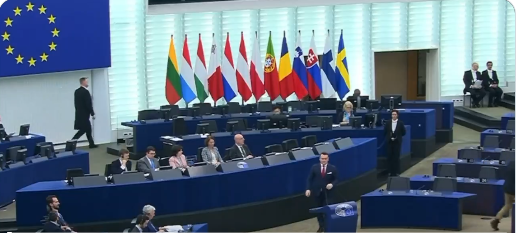On June 10, the day after the EU election, the political landscape in Europe will transform as the task of allocating the top four European positions and numerous other significant roles among the main political families begins. The political jockeying and speculation around these top jobs have been ongoing for months, with expectations high as the anticipated rise of the far-right could disrupt traditional power dynamics.
Malachy Steenson lays out why you should vote for him in the upcoming EU election.#IrelandBelongsToTheIrish pic.twitter.com/AHqSxxBDG0
— Niall O’Hara 🇮🇪 (@ThoughtsToby) May 29, 2024
The 27 EU heads of state and government will need to agree on the next presidents of the European Commission, the European Council, and the European Parliament, as well as the EU’s next foreign policy chief. These leaders will shape the bloc’s political direction until 2029. Observing who comes out without any roles will also indicate where power lies in the new EU configuration.
The immediate aftermath of the elections will see EU political leaders interpreting the results and strategizing accordingly. For example, if the center-right European People’s Party (EPP) remains the largest group, they might feel confident enough to nominate Ursula von der Leyen for a second term as European Commission President. Her team would then quickly start working to secure the 361 votes needed in the European Parliament for her reappointment.
Speech by @KONFEDERACJA_ cochairman @krzysztofbosak last year, when PiS gov announced a plan to give 400,000 work permits annually to foreigners.
EU election is in 2 weeks, Poles voting abroad need to register 5 days before election pic.twitter.com/Vy8EKwjifd
— Polish Connection (@PoleConnection) May 30, 2024
The initial weeks post-election will involve the European Parliament engaging in significant negotiations as various political groups vie for members by offering roles like committee coordinator positions. The Parliament’s outgoing President, Roberta Metsola, would likely organize a meeting to discuss these outcomes and strategies for moving forward.
Moreover, this period will see high-level meetings such as the G7 in Apulia, Italy, where leaders like von der Leyen, Charles Michel, Emmanuel Macron, Olaf Scholz, and Giorgia Meloni will meet for the first time post-election, potentially discussing the allocation of top EU positions.
By June 17, EU leaders will convene for an informal summit in Brussels to discuss these leadership roles, although formal decisions may not be made just yet. This meeting will be crucial for setting the stage for negotiations, with internal party meetings likely influencing the discussions.
🇪🇺 #EU elections – It is the first official day of campaign in #France. But if you were to roam the streets of Paris, you wouldn't know there is an election is going on.
That is what our European affairs editor @ArmenGeorgian experienced today ⤵️ pic.twitter.com/ntHn05Tkp2
— FRANCE 24 English (@France24_en) May 27, 2024
Towards the end of June, there’s hope that a consensus on the top jobs will be reached at the European Council meeting. The negotiations will consider political balance, geographical diversity, and gender representation. Given the complexities, including the need for von der Leyen to secure a significant parliamentary majority, the decision-making process could be protracted.
In July, the newly constituted European Parliament will vote on its President, with a potential deal allowing Metsola to continue her term until 2026. By then, political groups should have finalized an agreement on various parliamentary roles, adhering to a system of proportional representation while attempting to exclude far-right members from key positions.
If all goes as planned, the new European Commission president, after securing parliamentary approval, will lead a team tasked with significant responsibilities like competition, defense, and trade. Each EU country will nominate commissioners, with the strategic roles often being subject to intense negotiation.
The entire process will conclude with a formal vote in the European Parliament on the College of Commissioners, possibly coinciding with the U.S. elections. If successful, this will pave the way for the new EU leadership team to commence their duties, symbolically marked by the installation of Michel’s successor as the European Council president on December 1.
Major Points
- On June 10, following the EU elections, European leaders will begin the complex process of allocating the top positions within the EU, including the presidents of the European Commission, the European Council, and the European Parliament, as well as the EU’s foreign policy chief.
- The negotiations will reflect the new political dynamics, potentially influenced by the rise of the far right, which could disrupt the traditional balance of power within the EU.
- The European Parliament will play a crucial role in these appointments, with political groups vying for influence and negotiating to secure key committee positions and leadership roles.
- High-level meetings, such as the G7 in Italy and the European Council summits in Brussels, will serve as pivotal discussion points for EU leaders to hash out agreements on leadership positions.
- The entire appointment process is expected to conclude with the European Parliament’s vote on the new College of Commissioners, aligning with strategic EU goals and setting the stage for the next term of EU governance.
Conner T – Reprinted with permission of Whatfinger News



